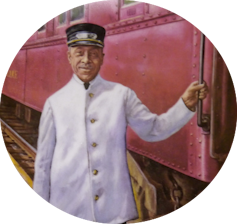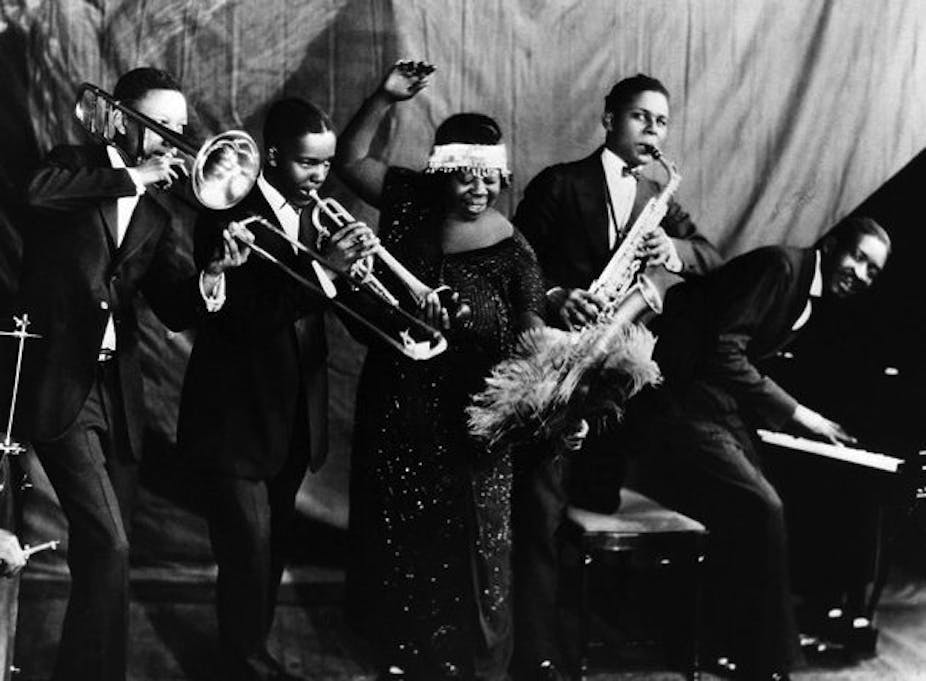In the 1920s and 1930s, record sales of black artists were very lucrative for the music industry. As a June 1926 article from Talking Machine World explained:
The Negro trade is…itself…an enormously profitable occupation for the retailer who knows his way about…. The segregation of the Negro population has enabled dealers to build up a trade catering to this race exclusively.
Yet record companies routinely took advantage of the more unschooled, vernacular performers – especially black ones, who were already denied access to broader markets. It was standard operating procedure back in the days of “race music” – the name given to recordings by black artists that were marketed to the black buying public.
“Some will rob you with a six-gun…and some with a fountain pen.” So said Woody Guthrie in his song “Pretty Boy Floyd.”
Bottom line: if record companies could get away with it, there was no bottom line. No negotiated contract to sign. No publishing. No royalties. Wham bam thank you man. Take a low-ball flat fee and hit the road. Anonymity was also implicit in the deal, so many black artists were forgotten, their only legacy the era’s brittle shellac disks that were able to withstand the wear of time.

One of the most prominent early race labels was Paramount Records, which, between 1917 and 1932, recorded a breathtaking cross-section of seminal African-American artists.
In 2013 I learned that Jack White of Third Man Records (in partnership with Dean Blackwood’s Revenant Records) would be putting together a compilation of Paramount’s historic recordings. The project would be a grand collaboration of two deluxe volumes that would contain a stunning 1,600 tracks.
I was part of a team of researchers and writers tasked with unearthing new information about the featured artists and their songs. For me, it was an opportunity to put a face on some of Paramount’s more enigmatic artists. Listening to track after track, a zeitgeist began to coalesce. As voices from the grooves accrued to tell a story of a collective black experience, I came to see these performances as cumulative cultural memory – each track a brushstroke in a painting of a long-forgotten landscape.
Here’s a taste of what I found.
Pullman Porters Quartette
The Pullman Company, manufacturers of railroad passenger cars, was magnanimous towards its African-American workforce. Among other benefits, they provided in-house musical instruction, which included a cappella quartet singing lessons.

The Pullman quartets, I learned, were a franchise: multiple configurations of singers performing concurrently under the company banner. They put on concerts, either performing live on the radio, or on long haul train routes as a form of passenger entertainment. The men who made the records were billed as the “President’s Own” – the working Pullman porters considered the company’s premier lineup.
In the late 1920s, The Pullman Porters Quartette of Chicago recorded a number of sides for Paramount. One tune was “Jog-a-Long Boys,” where they sang of sad roosters and being turned down by widow Brown, the “fattest gal in town.” The chorus went:
Jog-a-long, boys, jog-a-long, boys,
Be careful when you smile,
Do the latest style,
But jog-a-long, jog-a-long boys.
Jog-a-long, boys, jog-a-long, boys,
Don’t fool with google eyes,
That would not be wise,
But jog-a-long, jog-a-long boys.
At first, it seemed as if it were no more than a silly ditty performed in upbeat counterpoint harmony. Then it hit me: they were making light of a horrific reality – specifically, that a black man who dared to smile or even look askance at a white woman was putting himself in grave danger.
Look your best, but don’t forget your place…and just jog along, boys.
Horace George
Horace George of Horace George’s Jubilee Harmonizers was a showman and an opportunist, a versatile musician who performed in whatever style sold, whether it was novelty gospel, blues, comedy or jazz.
His gospel group cut one record for Paramount in 1924, but he first surfaced as early as 1906, advertised in the Indianapolis Freeman as “the great clarinetist, comedian, and vocalist.” A few years later, George found himself in Seattle as the “Famous Colored Comedian…who gives correct images,” and later as the “Man with the Clarinet” in a touring black vaudeville troupe, the Great Dixieland Spectacle Company.
In the late 1910s, a black newspaper – the Indianapolis Freeman – called Horace George “a novelty on any bill.” The novelty? He could play three clarinets at once!
Rev TT Rose
Beyond the rollicking piano-driven gospel sides he cut for Paramount in the late 1920s, nothing was known of Rev T T Rose. Rose’s “Goodbye Babylon” was the title track of Dust-to-Digital’s 2004 Grammy-nominated collection, Goodbye, Babylon. It was also inspiration for a rock ‘n’ roll tune by the Black Keys. And Rose’s recording of “If I Had My Way, I’d Tear This Building Down” – later performed by artists ranging from Rev. Gary Davis to the Grateful Dead – is one of the earliest known recorded versions of that song.
Rev Rose’s personal story was the most heartening of all. He lived in Springfield, Illinois, and I located his 90-plus-year-old daughter Dorothy, who described her father as a man on a mission to end racism and institutionalized segregation.
As a child, Rose had witnessed the aftermath of the infamous 1908 Springfield Race Riots, an event that precipitated the formation of the NAACP. In the late 1920s Rose moved from Chicago to Springfield, in order to minister the city’s black community.
In an oral history recording, Rev Rose described Springfield as “just really a type of Southern town” with an “overpowering resentment of the Negro…distrust and the fear that the Negro might someday become stronger.” When he returned to Springfield, he observed that the time that had elapsed since the race riots was “a very short span of time to erase all the scars and the prejudices and the hate that was engendered…in that very unfortunate affair.”
It was a hate, he continued, that “Kind of hung like a cloud from an atomic bomb over the whole neighborhood” causing the black citizens of Springfield to go “into themselves quite a bit.”
After his short recording career with Paramount in the late 1920s, Rev Rose went on to become a regional bishop in the Church of God in Christ. He recorded because he thought songs could both uplift and spread messages of hope and perseverance in the struggle for Civil Rights. When he sang “If I Had My Way,” it’s clear that the building he wanted to tear down was no less than the edifice of racism.
Lord, if I had my way,
Oh Lord, if I, if I had my way,
In this wicked world, if I had my way,
God, knows I’d tear this building down.

